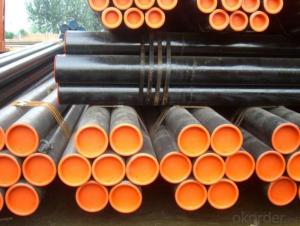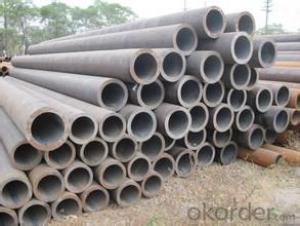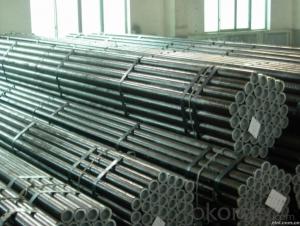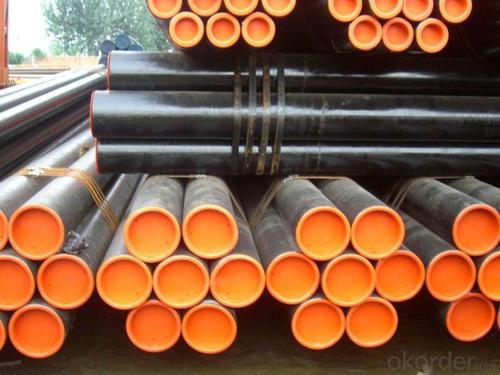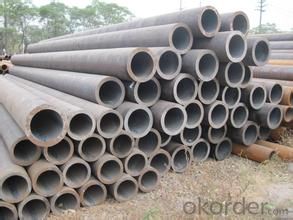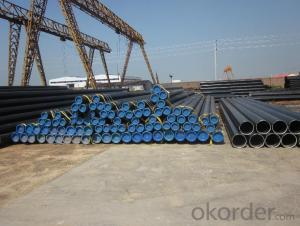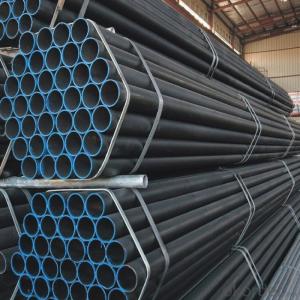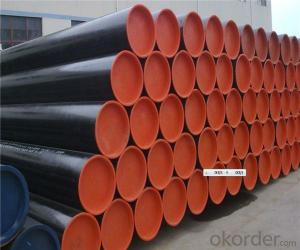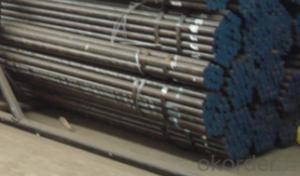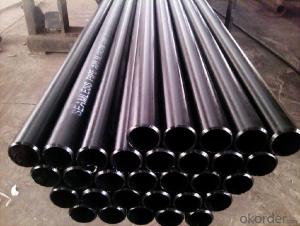Carbon Steamless Steel Pipe From China CNBM
- Loading Port:
- Tianjin
- Payment Terms:
- TT or LC
- Min Order Qty:
- 20 m.t.
- Supply Capability:
- 9000 m.t./month
OKorder Service Pledge
OKorder Financial Service
You Might Also Like
1、Structure of Seamless Pipe ASTM A106/53:
Seamless pipe is formed by drawing a solid billet over a piercing rod to create the hollow shell. As the manufacturing process does not include any welding, seamless pipes are perceived to be stronger and more reliable. Historically seamless pipe was regarded as withstanding pressure better than other types, and was often more easily available than welded pipe.
2、Main Features of the Seamless Pipe ASTM A106/53:
• High manufacturing accuracy
• High strength
• Small inertia resistance
• Strong heat dissipation ability
• Good visual effect
• Reasonable price
3、Seamless Pipe ASTM A106/53 Specification:
| 1 | Product | seamless steel pipe | |
| 2 | Standard | U.S.A. | ASTM A53/A106/A178/A179/A192/A210/A213/ A333/A335/A283/A135/A214/A315/A500/A501/A519/A161/A334 API 5L/5CT |
| Japan | JIS G3452/G3454/G3456/G3457/G3458/G3460/3461/3462/3464 | ||
| German | DIN 1626/17175/1629-4/2448/2391/17200 SEW680 | ||
| Britain | BS 1387/1600/1717/1640/3601/3602/3059/1775 | ||
| Russia | GOST 8732/8731/3183 | ||
| China | GB/T8162/T8163 GB5310/6579/9948 | ||
| 3 | Material Grade | U.S.A. | Gr. B/Gr.A/A179/A192/A-1/T11/T12/T22/P1/FP1/T5/4140/4130 |
| Japan | STPG38,STB30,STS38,STB33,STB42,STS49, STBA23,STPA25,STPA23,STBA20 | ||
| German | ST33,ST37,ST35,ST35.8,ST45,ST52,15Mo3, 13CrMo44, 1.0309, 1.0305, 1.0405 | ||
| Britain | Low, Medium, high | ||
| Russia | 10, 20, 35, 45, 20X | ||
| China | 10#, 20#, 16Mn, 20G, 15MoG, 15CrMo, 30CrMo, 42Crmo, 27SiMn, 20CrMo | ||
| 4 | Out Diameter | 21.3mm-609.6mm | |
| 5 | Wall Thickness | 2.31mm-40mm | |
| 6 | Length | As per customers' requirements | |
| 7 | Protection | Plastic caps/ Wooden case | |
| 8 | Surface | Black painting/varnished surface,anti-corrosion oil, galvanized or as per required by customer | |
4、Packaging & Delivery
Packaging Details: | seaworthy package,bundles wrapped with strong steel strip |
Delivery Detail: | 15-30days after received 30%TT |
5、FAQ of Seamless Pipe ASTM A106/53:
①How is the quality of your products?
Our products are manufactured strictly according to national and internaional standard, and we take a test
on every pipe before delivered out. If you want see our quality certifications and all kinds of testing report, please just ask us for it.
Guaranteed: If products’ quality don’t accord to discription as we give or the promise before you place order, we promise 100% refund.
②How about price?
Yes, we are factory and be able to give you lowest price below market one, and we have a policy that “ for saving time and absolutely honest business attitude, we quote as lowest as possible for any customer, and discount can be given according to quantity”,if you like bargain and factory price is not low enough as you think, just don’t waste your time.Please trust the quotation we would give you, it is professional one.
③Why should you chose us?
Chose happens because of quality, then price, We can give you both.Additionally, we can also offer professional products inquiry, products knowledge train(for agents), smooth goods delivery, exellent customer solution proposals.Our service formula: good quality+good price+good service=customer’s trust
SGS test is available, customer inspection before shipping is welcome, third party inspection is no problem.
6、Seamless Pipe ASTM A106/53 Images:
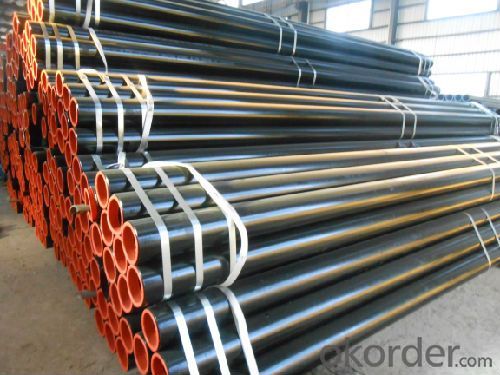
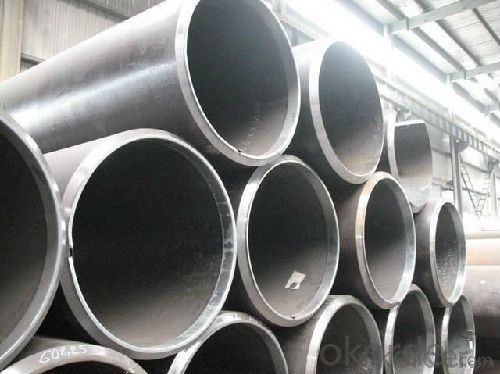
- Q: How do you determine the maximum allowable stress for a steel pipe?
- Several factors need to be taken into account in order to determine the maximum stress that a steel pipe can withstand. The type of steel used in the pipe is of utmost importance, as different types have varying mechanical properties and strengths. Additionally, the dimensions and thickness of the pipe are significant factors in determining its maximum stress capacity. Generally, thicker pipes have higher stress limits compared to thinner ones. Furthermore, it is crucial to consider the operating conditions that the pipe will be exposed to. This includes the temperature, pressure, and the nature of the fluid flowing through the pipe. These conditions can greatly impact the maximum stress that the pipe can tolerate. For instance, high temperatures or corrosive fluids can weaken the steel and reduce its strength. Engineers typically rely on industry standards and codes, such as the ASME Boiler and Pressure Vessel Code and the API standards, to determine the maximum stress limit. These standards provide guidelines and formulas for calculating the maximum stress based on the material properties, dimensions, and operating conditions of the pipe. It is important to emphasize that determining the maximum stress limit is a critical step in ensuring the structural integrity and safety of the steel pipe. It requires a comprehensive understanding of the materials, design considerations, and industry standards. Therefore, it is advisable to seek guidance from experienced engineers or professionals who specialize in piping design and analysis to accurately determine the maximum stress that a steel pipe can withstand.
- Q: Can steel pipes be used for steam distribution?
- Yes, steel pipes can be used for steam distribution. Steel pipes are commonly used for conveying steam due to their high heat resistance and durability. They can withstand the high temperatures and pressures associated with steam distribution, making them a suitable choice for this application.
- Q: How are steel pipes protected against UV radiation?
- Steel pipes are typically protected against UV radiation by applying a coating or paint that contains UV stabilizers. These stabilizers help to prevent the degradation and discoloration of the steel caused by prolonged exposure to sunlight and UV rays.
- Q: What are the factors affecting the cost of steel pipes?
- The factors affecting the cost of steel pipes include the price of raw materials such as iron ore and coal, the cost of energy and transportation, market demand and supply dynamics, currency exchange rates, manufacturing and labor costs, and any additional taxes or tariffs imposed on steel imports. Other factors may include technological advancements, regulatory compliance, and the overall economic conditions of producing countries.
- Q: Can steel pipes be used for transporting slurry?
- Yes, steel pipes can be used for transporting slurry. Steel pipes are commonly used in various industries, including mining, construction, and oil and gas, for transporting different types of fluids, including slurry. Slurry is a mixture of solid particles suspended in a liquid, usually water, and steel pipes have the required strength and durability to handle the abrasive nature of slurry. Additionally, steel pipes have excellent resistance to corrosion, which is crucial when dealing with slurry that may contain corrosive elements. The smooth inner surface of steel pipes also helps to minimize friction and ensure efficient flow of the slurry. Overall, steel pipes are a reliable and commonly used choice for transporting slurry due to their strength, durability, corrosion resistance, and smooth inner surface.
- Q: How do steel pipes handle ground freezing and thawing?
- Steel pipes are highly resistant to ground freezing and thawing due to their inherent strength and durability. They are designed to withstand extreme temperature variations without significant damage or deformation. Additionally, steel pipes have low thermal conductivity, meaning they do not transfer heat as easily as other materials, allowing them to maintain their structural integrity even in freezing conditions. Thus, steel pipes are an excellent choice for underground infrastructure and can effectively handle ground freezing and thawing.
- Q: Can steel pipes be used for underground water treatment systems?
- Yes, steel pipes can be used for underground water treatment systems. Steel pipes are known for their durability, strength, and resistance to corrosion, making them suitable for various applications, including underground water treatment systems. They can withstand the pressure and environmental conditions found underground, ensuring the safe and efficient transport of water within the treatment system. However, it is important to consider the water quality and potential for corrosion in the specific location when selecting the type of steel and implementing protective measures, such as coatings or cathodic protection, to prevent corrosion and ensure the longevity of the pipes.
- Q: What is the difference between hot-dip galvanizing and electroplating of steel pipes?
- Steel pipes can be protected from corrosion using two different methods: hot-dip galvanizing and electroplating. To protect steel pipes using hot-dip galvanizing, they are immersed in a molten bath of zinc. The zinc reacts with the steel to create a strong and uniform coating that effectively prevents corrosion. This method is commonly used for outdoor applications and in harsh environments where the pipes are exposed to water or chemicals. In contrast, electroplating involves depositing a thin layer of metal, usually zinc, onto the surface of the steel pipes using an electric current. The steel pipes act as the cathode, and a zinc anode is placed in a solution containing zinc ions. The electric current causes the zinc ions to react with the steel and form a thin coating. Electroplating is often chosen for indoor applications or when aesthetics are a priority. Hot-dip galvanizing generally provides a thicker and more durable coating compared to electroplating. The hot-dip galvanized coating is several times thicker than the electroplated zinc coating, offering better corrosion protection and a longer lifespan for the pipes. The appearance of the coatings also differs. Hot-dip galvanizing results in a matte gray finish, while electroplating can give a more lustrous and shiny appearance. Cost-wise, hot-dip galvanizing is more cost-effective for larger projects because it can coat multiple pipes simultaneously. On the other hand, electroplating is usually more expensive and time-consuming, especially for larger quantities of steel pipes. Ultimately, the choice between hot-dip galvanizing and electroplating depends on the specific requirements of the project, including the intended application, environment, aesthetics, and budget constraints.
- Q: Seamless steel pipe and welded pipe what is the difference?
- The welded pipe is made directly from the stainless steel band by machine, and it is made of round steel or perforated by Guan Pi
- Q: How do you measure the diameter of a steel pipe?
- To measure the diameter of a steel pipe, you can use a caliper or a measuring tape. Place the caliper jaws or measuring tape around the widest part of the pipe, ensuring it is perpendicular to the pipe's axis. Take the reading displayed on the caliper or measure the distance between the two points on the measuring tape. This measurement will provide you with the diameter of the steel pipe.
Send your message to us
Carbon Steamless Steel Pipe From China CNBM
- Loading Port:
- Tianjin
- Payment Terms:
- TT or LC
- Min Order Qty:
- 20 m.t.
- Supply Capability:
- 9000 m.t./month
OKorder Service Pledge
OKorder Financial Service
Similar products
Hot products
Hot Searches
Related keywords
